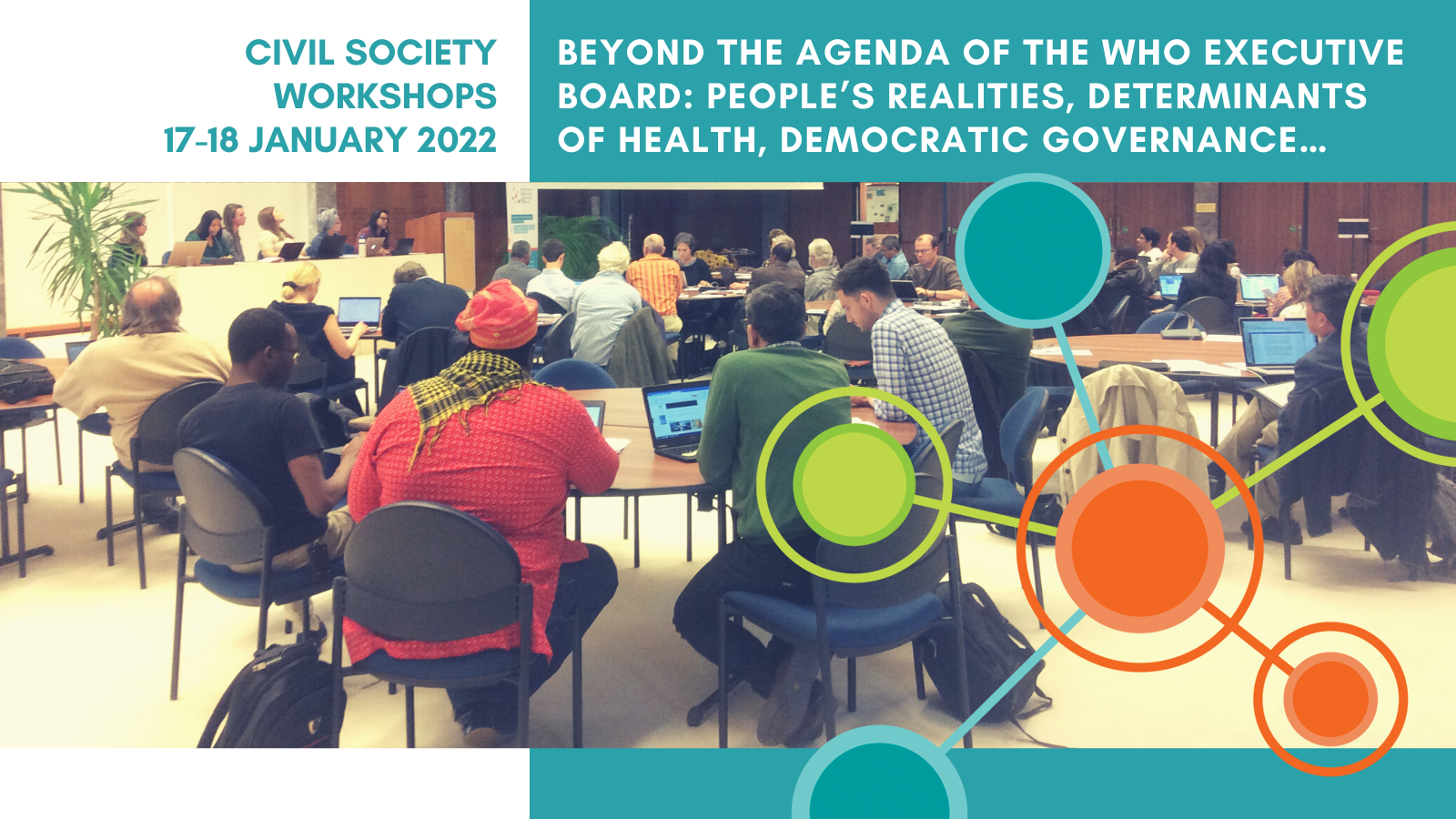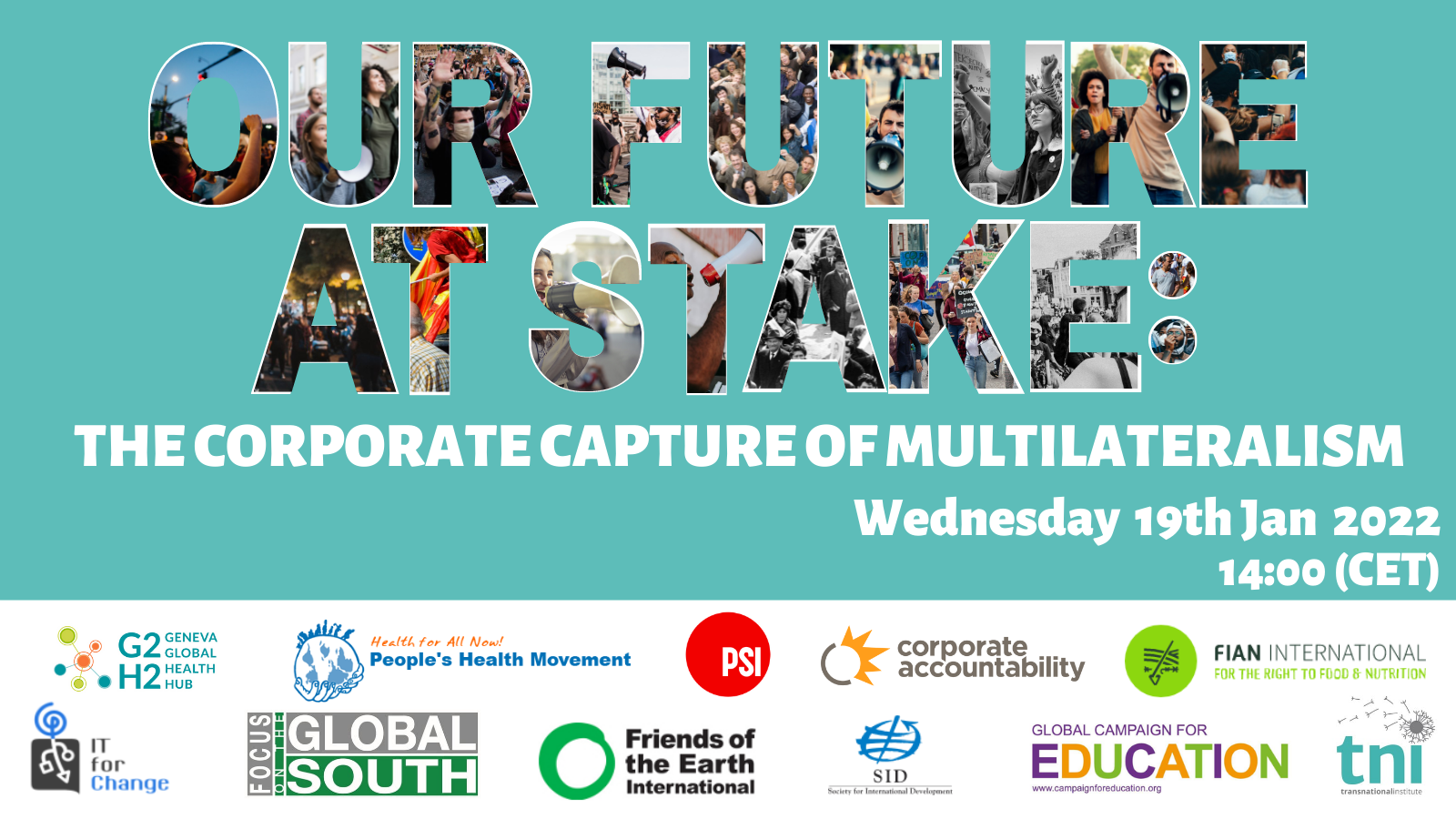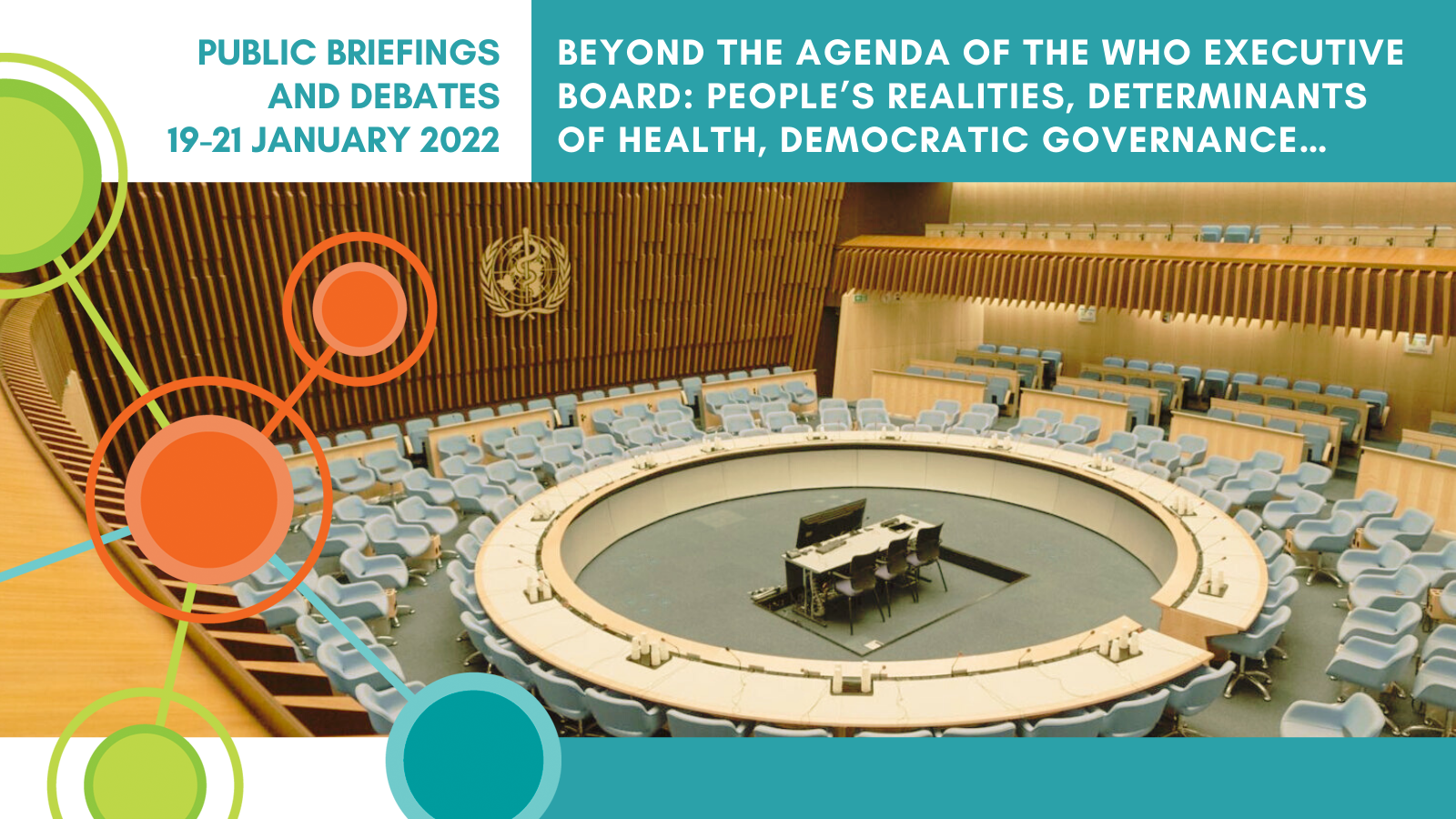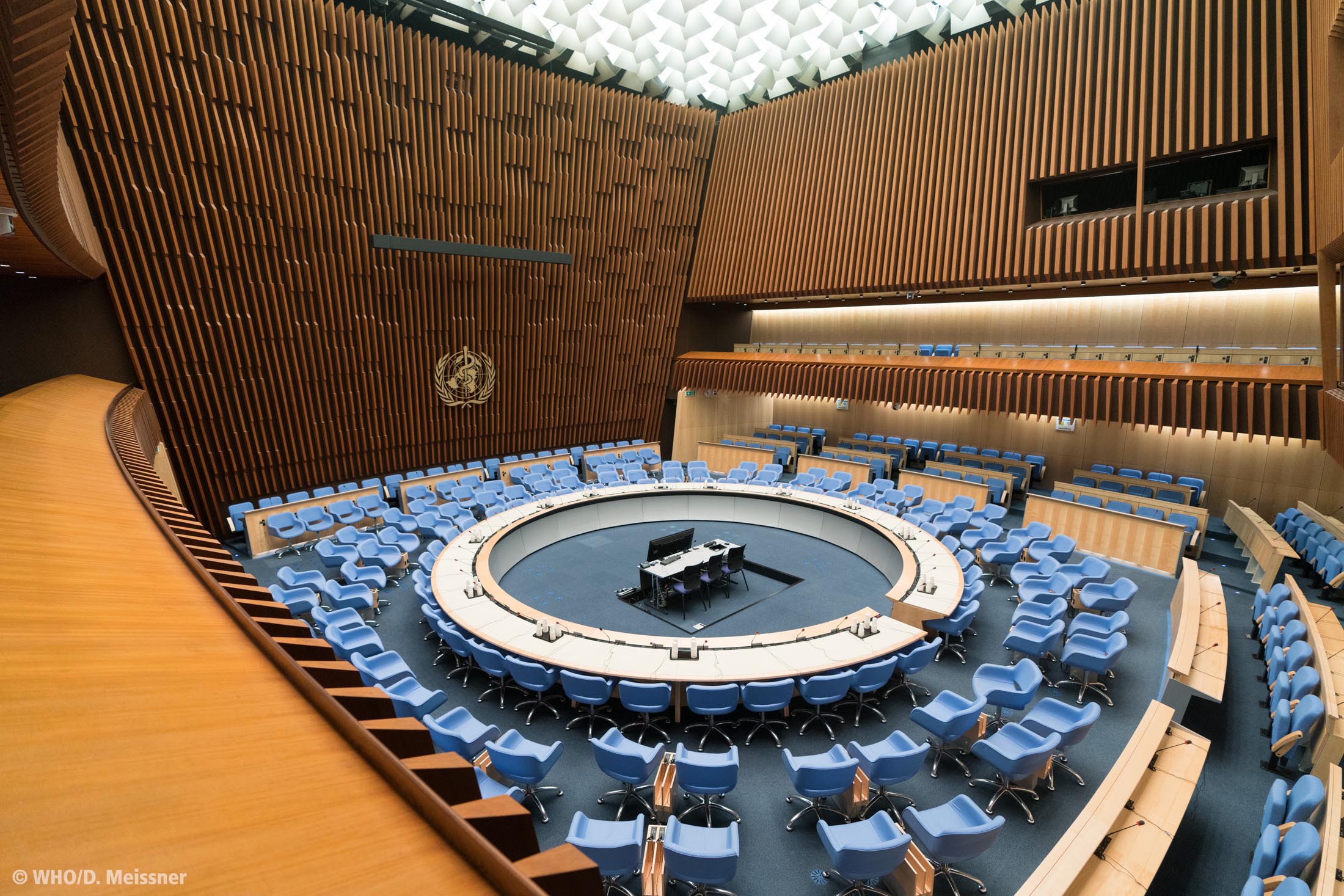Beyond the agenda of the WHO Executive Board: People’s realities, determinants of health, democratic governance…
Series of civil society workshops and public briefings and debates hosted by the Geneva Global Health Hub (G2H2), 17-21 January 2022
In the week before the 150th Session of the WHO Executive Board, a series of meetings organized by the Geneva Global Health Hub (G2H2) and some of its members will provide a space for sharing, assessing and debating health policy and governance challenges that go beyond the items covered by the formal agenda of WHO EB, bridging from health policies to people’s realities, addressing determinants of health and promoting democratic governance.
Programme
Monday-Tuesday: Civil society workshops
Monday, 17 January 2022, 13.00-14.30 and 15.00-16.30 CET
Are global civil society organizations still relevant at the UN organizations?
Workshop organized by IAHPC
Tuesday, 18 January 2022, 13.00-14.30 and 15.00-16.30 CET
Back to Alma Ata: WHO, democratic space and citizens’ participation in shaping health policies
Workshop organized by Viva Salud
Documentation: below
Intersectoral roundtable
Wednesday, 19 January 2022 14.00-15.30 CET
Our future at stake: The corporate capture of multilateralism
Public roundtable organized by the People’s Working Group on Multistakeholderism
Documentation: TNI website
Wednesday-Friday: Public briefings and debates
Wednesday, 19 January 2022 16.00-17.30 CET
Health systems and pandemic response in Latin America: Lessons for the Pandemic Treaty debates
Session organized by PHM/ALAMES
Thursday, 20 January 2022, 13.00-14.30 CET
The “Universal Health and Preparedness Review”: Looking at the proposed new accountability mechanism from a civil society and global public health governance perspective
Session organized by Save the Children
Thursday, 20 January 2022, 15.00-16.30 CET
Sustainable healthy diets: Why are they so crucial after COVID-19?
Session organized by SID
Friday, 21 January 2022, 15.00-16.30 CET
The pandemic treaty and the right to development: learning from COVID-19 lessons
Session organized by G2H2 project team
Programme details and contacts: below
Documentation

Monday, 17 January 2022, 13.00-14.30 and 15.00-16.30 CET
Civil society brainstorming/strategizing workshop (closed session)
Are global civil society organizations still relevant
at the UN organizations?
Escalating tensions between Member States and the UN organizations signal a decline of multilateralism and a return to the Westphalian system, marginalizing accredited civil society organizations and undercutting real progress towards sustainable global health policies and practices that benefit structurally vulnerable populations. So what role, if any, can global civil society play to make the deliberations and outcomes of UN organizations fit for 21st century purpose?
Global civil society drives a cosmopolitan vision of sustainable peace and human development. The UN has traditionally recognized civil society as a key partner in accomplishing its mission and goals. The ECOSOC and WHO Secretariats have divisions that accredit CSOs and facilitate their participation in member state meetings. Yet this participation is largely contingent on Member State support or withdrawal thereof. Unless member states take affirmative action to support the role of civil society in UN meetings, requesting that they be given a meaningful voice in deliberations, global civil society voices, already marginalized, will quickly become as irrelevant as the inter-agency cooperation framework – mandated by the UNGA to help member states achieve the SDGs. New geopolitical alignments are challenging these inter-agency collaborations, along with CSO space, voice, and funding, further endangering a sustainable global health and human rights agenda.
- Civil society workshop organized by: International Association for Hospice and Palliative Care
- Contact for enquiries: Katherine Pettus, kpettus@iahpc.com
Documentation
The workshop
- Slides: Overview of civil society workshop, with two sessions and invited speakers
G2H2 January17 – slides
First session
- Concept note for the first session, with speakers’ bios
G2H2 January 17 – concept note - Joint statement by 61 UN member states at the UN General Assembly 3 Committee meeting
“The participation of civil society and human rights defenders in this committee is decisive.”
Statement delivered by the representative of Costa Rica October 2021
Second session
- WHO: “Involvement of non-State actors in WHO’s governing bodies”
Presentation by Thomas Schwarz, MMI Network (PPT as PDF) - WHO documents for EB150:
NSA EB150 22.3 English – invitation and guidelines for “non-state actors”
B150_37-en – “Involvement of non-state actors in WHO’s governing bodies” - Towards a more meaningful engagement of WHO with civil society
Joint assessment of proposals regarding CSO participation in WHO Governing Bodies
Signed by various civil soicety representatives, May 2019 - Session follow-up: Joint CSO Letter on NSA Involvement in WHO Governing Bodies
https://www.ippf.org/news/announcements/joint-cso-letter-nsa-involvement-who-governing-bodies
Tuesday, 18 January 2022, 13.00-14.30 and 15.00-16.30 CET
Civil society brainstorming/strategizing workshop (closed session)
Back to Alma Ata: WHO, democratic space and citizens’ participation in shaping health policies
Community engagement and participation were at the heart of the Alma Ata Declaration in 1978. The fourth article of the Declaration states that “people have the right and duty to participate individually and collectively in the planning and implementation of their health care”.
More than 40 years later, this sounds like a faraway dream. Social movements and activists defending the right to health are facing increasing pressure all over the world and citizens’ control over health policy stands at an all time low. How can we change this trend? How can social movements and health activists be involved and participate in decision-making about national and local health governance? What can be done to create and enhance the democratic space for social movements defending the right to health in WHO’s Member States? And why should the WHO relate to these actors and questions? And how?
In this civil society workshop, we want to think with the wider movement for the right to health about how we and the World Health Organization can strengthen the democratic space for the social movement for health and improve citizen’s control over health policy.
- Civil society workshop organized by: Viva Salud
- Contact for enquiries: David Verstockt, david@vivasalud.be / Jasper Thys, jasper.thys@vivasalud.be
Documentation
The workshop
- Workshop outline
Back to Alma Ata – G2H2 workshop - Recording: Opening and case studies presented, in original language (Spanish – French – English)
Zoom cloud recording, 105 Min
Inputs
- Case study Bolivia, by Emira Imaña, ALAMES
- Tuesday – Bolivia
- Case study Democratic Republic of Congo, by Erick Kambale, Étoile du Sud
Tuesday – DRC - WHO’s role in strengthening social participation at country level participation at country level, by Kira Koch, WHO
Tuesday – Kira Koch WHO
References
- Building a movement for health
Website and Manual by PHM / Viva salud - Voice, agency, empowerment – handbook on social participation for universal health coverage
WHO, 2021 - “The people have the right and duty to participate individually and collectively in the planning and implementation of their health care”
Declaration of Alma-Ata, 1978 - 40 Years of Alma-Ata: Translating ‘Health for All’ into the Present and Future
Statement of civil society workshop hosted by G2H2, May 2018

Wednesday, 19 January 2022, 14.00-15.30 CET
Intersectoral roundtable
Our future at stake: the corporate capture of multilateralism
The roundtable aims to address the WEF/Davos agenda of multistakeholderism and to initiate a dynamic exchange and contribute to building a dialogue between concerned social movements, affected sectors and governments. The roundtable will contest the vision and trajectory of the multistakeholder approach as the only way to address the multiple inter-related crises, and will explore the challenges to be faced in exposing the take-over of our common future by the actors of global corporate power and what is to be done about it
- Intersectoral roundtable organized by the People’s Working Group on Multistakeholderism
- Languages: English, Spanish
- TNI website: here

Wednesday, 19 January 2022, 16.00-17.30 CET
Public briefing and debate
Health systems and pandemic response in Latin America: Lessons for the Pandemic Treaty debates
Latin America is the region that has been paying one of the highest prices in this pandemic, not only because of the policy of Covid-19 denial by some high-profile politicians, but also because of the legacy of international financial policies aimed at drastic reductions of public investment in health. Because of this, health systems and surveillance systems in Latin America have been weakened or even suppressed in some countries.
These strategies, pursued by multilateral circles and rich countries in particular, have undermined WHO’s and PAHO’s authority and role in the world, and by doing so they have undermined the needs of Latin America for another kind of global governance in health, more democratic and inclusive.
In this session, we want to explore if and how the process for a Pandemic Treaty can provide a space to push for reforms that could lead to a new framework of global governance. Different case studies have been developed at regional, national, and subnational levels: they provide illustration of experiences, barriers, and facilitated processes of social participation in identifying health solutions in the context of the Covid-19 pandemic. These examples can provide instances of democratic control that could inspire an alternative perspective of health governance, as well as governance of intergovernmental and regional health institutions.
It is our conviction that also the global dimension of health governance might draw important lessons from such concrete experiences from Latin America, in relation to the preparedness and response to future pandemics, particularly if we want to look at the construction of health sovereignty and global equity in health. At the end of the discussion, we aim to have a better idea of how to influence international health organisations in a way to support the needs of everyone.
- Session organized by: People’s Health Movement and ALAMES
- Contact for enquiries: Ana Vracar, ana@phmovement.org
Documentation (to be complemented)
- Session recording (in original languages, no translations)
Zoom cloud - Introduction by ALAMES (Spanish)
Sistemas de Salud y respuesta a una pandemia en América Latina alames - Video collage of experiences from PHM LA circles (Spanish)
https://wetransfer.com/downloads/3b4fcb47e3da9e67faebd33ca58f03db20220119025728/733491
Thursday, 20 January 2022, 13.00-14.30 CET
Public briefing and debate
The “Universal Health and Preparedness Review”: Looking at the proposed new accountability mechanism from a civil society and global public health governance perspective
The Universal Health and Preparedness Review (UHPR) has been proposed by WHO as a means to increase accountability and transparency among Member States in gap identification and capacity building for better health emergency preparedness. The peer-review nature of the envisioned UHPR would ensure that key issues identified will be acted upon at the highest political levels of government and that relevant recommendations will be followed up upon and monitored on regular basis. It is envisioned that the UHPR will help establish a platform for multisectoral engagement across government and whole of society to review the nation’s health and preparedness progress and challenges.
The objective of the session is to brief civil society organizations (CSO) and other actors on the Universal Health and Preparedness Review and to discuss options for the engagement of the civil society in the UHPR mechanism, notably using the lessons from CSO engagement in other accountability mechanisms such as the Universal Periodic Reviews.
- Public session organized by: Save the Children
- Contact for enquiries: Margot Nauleau, margot.nauleau@savethechildren.org
Documentation (to be complemented)
The session
- Session recording
Zoom cloud recording - Session outline with invited speakers
UHPR Public Briefing session outline - UHPR: Input by WHO Secretariat
UHPR – slides WHO Dr Chungong
References
- A high-level peer-review process for future pandemic preparedness: practical lessons from the Universal Periodic Review
UPR Info, Konrad Adenauer Foundation
Thursday, 20 January 2022, 15.00-16.30 CET
Public briefing and debate
Sustainable healthy diets: Why are they so crucial after COVID-19?
The concept of diets has gained ground at different levels over the past few years. It has become a central element of discussion within the food and agriculture community, as well as in the health arena, especially under the framework of the UN Decade of Action on Nutrition and the 2030 Agenda and the Sustainable Development Goals. The concept of diets goes beyond the mere understanding of food as a product consumed in isolation. It rather embraces the diverse elements that constitute diets and assess how these might contribute to the health of individuals. Under a food systems approach, diets have been increasingly linked with the environmental and cultural aspect. Civil society platforms have long advocated for the unconditionality of a healthy planet for healthy diets. For their part, FAO and WHO have jointly developed guiding principles for supporting governments’ policies to transform food systems.
These important efforts have sparked discussions on the need to incorporate terminology aimed to capture the interconnectedness between health, food, environment, culture, and society. It is through this nexus that the concept of “sustainable healthy diets” has emerged and affirmed itself. But multiple barriers to the implementation of these approaches remain, which are often reflected in negotiating outcomes. This policy dialogue aims to reflect on these barriers, and stimulate strategic discussions towards advancing the notion of “sustainable healthy diets”, while giving evidence on how this concept may indeed be key for driving systemic change in the political economies of food production, distribution, and consumption, particularly after the COVID-19 pandemic.
- Public session organized by: Society for International Development (SID)
- Contact for enquiries: Magdalena Ackermann, mackermann@sidint.org
Twitter: @SID_INT – #SustainableHealthyDiets – #EB150
Documentation (to be complemented)
Session recordings
- Original language: Zoom cloud recording
- English: YouTube
Session documentation
- Programme flyer with speakers: PDF – JPG
- Isabel Alvarez Vispo, URGENCI – Spain
Dietas sanas y sostennibles. Un cambio necesario (PPT as PDF) - Hernando Salcedo Fidalgo, FIAN Colombia – Colombia
Mirada holística a los Determinantes estructurales de la pandemia por Covid 19 (PPT as PDF) - Dr. Juan Rivera Donmarco, Instituto Nacional de Salud Pública – México
Sustainable healthy diets: Why are they so crucial after COVID-19? (PPT as PDF)
References/Resources
- CSM Vision on Food Systems and Nutrition: An Alternative to the Voluntary Guidelines on Food Systems and Nutrition (VGFSyN) – Civil Society and Indigenous Peoples’ Mechanism (CSM) for relations with the Committee on World Food Security (CFS)
https://www.csm4cfs.org/wp-content/uploads/2016/02/EN-vision-VGFSyN.pdf - FAO and WHO. 2019. Sustainable healthy diets – Guiding principles
https://www.fao.org/3/ca6640en/ca6640en.pdf - Salcedo Fidalgo, H. Corporate Food Paradigms and Health Crisis: The Image of a Syndemic Crash. Development 63, 205–208 (2020).
https://doi.org/10.1057/s41301-020-00265-x - Salcedo Fidalgo, H. The Coronavirus Pandemic: A Critical Reflection on Corporate Food Patterns. The Right to Food and Nutrition Watch 12, 16-23 (2020).
https://www.righttofoodandnutrition.org/files/article_2_rtfn_watch12-2020_eng-2.pdf - Salcedo Fidalgo, H. Comment sortir du système agro-industriel ? Un enjeu de santé publique face à la protection de la biodiversité. Biodiv’2050 19, 15 (2019).
PDF
Friday, 21 January 2022, 15.00-16.30 CET
Public briefing and debate
The pandemic treaty and the right to development: Learning from COVID-19 lessons
In a historic special session of the World Health Assembly, the international community has unanimously decided to embark into negotiations for a new pandemic convention or other binding instrument, with the aim to better prepare and respond to future pandemic events. A certain enthusiasm has been triggered in global health circles by the novelty of this diplomatic route. The negotiating wind now has gained worldwide strength, but what sense of direction it will actually take does not yet seem to be very clear, due to a combination of missing evidence and thematic complexity. The World Health Assembly Special Session has indicated different possible routes, not necessarily converging.
While it may be too early to assess the outcome of the WHO pandemic treaty negotiations, in the third year of COVID-19 the international community should clearly recognize the new political categories that COVID-19 has imposed on the global health agenda and the urgency to address the pandemic preparedness and response in terms of the two intertwined challenges of social inequality and climate crisis. A new development paradigm is needed for the world and the right to health is not only a key driver of human life and dignity, but it is also indispensable for the exercise of all other human rights and for orienting policymaking towards the safeguard of biodiversity and respect of planetary boundaries. Because of its peculiar capacity, the right to health is recognized in multiple international instruments.
The G2H2 report (“The politics of a WHO pandemic treaty in a disenchanted world”) launched in November 2021, makes a direct connection between the right to health and the right to development. While exacerbating the world’s deep structural injustices, COVID-19 forces a new sense of purpose to policymaking in the field of public health, beyond the individual-level biological causes or risk factors and the disproportionate emphasis on technological solutions. A pandemic is not a fact of life, a natural phenomenon. It represents instead the by-product of a systemic governance failure that can and must be avoided through a considerable change of direction and the adoption of a new development paradigm pursued through international cooperation and a new interconnected intergovernmental vision in formal diplomatic fora.
The overuse of natural resources in the past two centuries has caused global warming and is having a direct effect on the health of people and on the environment, with a detrimental result for the current generation and for generations to come, determining intergenerational inequity. More than ever, it is paramount for the international community to immunize itself from the temptation of preserving existing relations of power among nations, notwithstanding their failures, in the name of a neoliberal conception of global governance and an old notion of health security.
The main goal of this public debate is very simple. We want to illustrate and discuss the correlation between the right to health and the right to development in the context of the international commitment to prevent future pandemics and better prepare the world to tackle future infectious outbreaks like COVID-19. The discussion aims to seed new knowledge and assert a new approach about the inevitable intersection across current diplomatic routes ongoing in Geneva, which have been parallel and largely disconnected so far.
The Earth’s counterattack to the universalized Western development model provides the cogent opening of a paradigmatic change. This is no time to waste the pandemic health and socio-economic crisis in reductionist solutions for the future.
- Session organized by: G2H2 pandemic treaty project team
- Language: English
- Registration Zoom webinar: here
- Contact for enquiries: Nicoletta Dentico, ndentico@sidint.org
Documentation (to be complemented)
The session
- Session recording (English)
Zoom cloud recording - Session card with programme/speakers
PDF – JPG - Session outline, with invited speakers
PDF
G2H2 report
- The politics of a pandemic treaty
Report on G2H2 website
PDF: Final English version, January 2022
References/resources
proposed by speakers and participants
- International solidarity in an interdependent world
https://www.ohchr.org/Documents/Issues/Development/RTDBook/PartIIChapter14.pdf - Operationalizing the Right to Development: Realizing Global Solidarity, Shared Responsibility and the Duty of International Cooperation in the Fight Against COVID-19
https://www.ohchr.org/EN/Issues/Development/Pages/intro-training-on-rtd-and-sdgs.aspx - Implementation and enhancement of international cooperation in the field of human rights
- Report of the United Nations High Commissioner for Human Rights
https://undocs.org/A/HRC/47/47 - International solidarity in aid of the realization of human rights during and after the coronavirus disease (COVID-19) pandemic Report of the Independent Expert on human rights and international solidarity, Obiora Chinedu Okafor
https://undocs.org/A/HRC/47/31 - Right to development, Report of the Secretary-General and the United Nations High Commissioner for Human Rights
https://undocs.org/A/HRC/48/26 - Achieving sustainable health equity
https://apps.who.int/iris/bitstream/handle/10665/351054/PMC8722628.pdf?sequence=1&isAllowed=y -
The Need for Recovering the Subjugated Knowledge of Traditional Chinese Medicine
https://link.springer.com/article/10.1057/s41301-020-00276-8 - The World Health Assembly Special Session and the Pandemic Treaty Controversy
https://www.thinkglobalhealth.org/article/world-health-assembly-special-session-and-pandemic-treaty-controversy - The Proposed Pandemic Treaty and the Challenge of the South for a Robust Diplomacy
https://www.southcentre.int/wp-content/uploads/2021/05/SouthViews-Aginam.pdf -
Omicron is a product of vaccine apartheid
https://iigh.unu.edu/news/news/omicron-is-a-product-of-vaccine-apartheid.html -
Beyond COVID-19: Africa and the future of global health governance
https://africa-health.com/wp-content/uploads/2021/11/AH-2021-10-21-GHG.pdf

This series of civil society workshops and public briefings and debates was set up as Zoom meetings (closed workshops) and webinars (public sessions), including an intersectoral roundtable co-hosted by G2H2 as part of a civil society working group on multistakeholderism (public session). For general enquiries, please get in touch with the G2H2 secretariat. Thank you!
Photo: WHO / D Meissner
